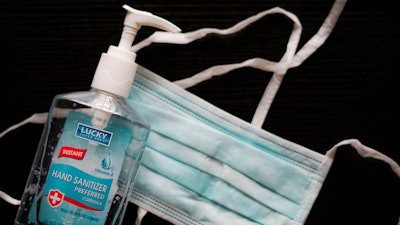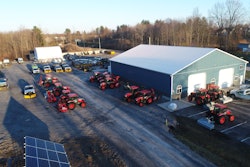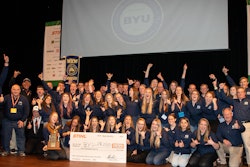
As landscape business owners face the reality of what COVID-19 could mean for their operations, many have already begun to put plans in place and face potential challenges head-on. As many believe we are still in the early stages of what this pandemic could mean for our nation—and our businesses—now is to be the time to plan ahead. We spoke to NALP members across the country to find out how they’re preparing.
A Rapidly Evolving Situation
Brandon Sheppard, member of the Weed Man Sub-Franchisor team who operates the Weed Man franchise in Winchester, Virginia; Annapolis, Maryland; Bethesda, Maryland; Rockville-Gaithersburg, Maryland; and Frederick, Maryland, says that the coronavirus situation is the “definition of a rapidly evolving situation,” and as a result, they’ve been forced to make major decisions with limited information.
Like others, the impact to his business is presently minimal—but he’s aware that could change.
“We’ve been working to ready our workplace and customers to survive and thrive in the face of COVID-19,” Sheppard says. “Like most businesses we’ve incorporated enhanced sanitation and cleaning procedures for all work equipment and surfaces. Additionally, we have implemented staggered start times for our lawn care technicians and have distributed our office staff through our campus to minimize the prospect of spreading the virus amongst our team. We also purchased several laptops in order to empower more of our team to work remotely. And we’ve done our best to communicate changes in how we deliver our services to our customers in order to continue caring for their property while protecting the health of our team and the community. Paper invoices or other materials are no longer left at the home and we are not knocking on doors.”
Impacting Business
Some areas of business are naturally going to be hit harder than others. Neil Bales, partner in the Dallas/Fort Worth, Texas-based LandPatterns, an architectural firm, says that he suspects the economic downturn that will be caused by this situation will cause some ripple effects into their construction business in the next six to 12 months. But the weeks and months ahead will be crucial.
 NALP
NALP
“This is a really great opportunity for landscape business owners to show their people how much they care for them,” Trimmer adds.
In Hillsboro, Oregon, Bob Grover, president of Pacific Landscape Management, says that he has already had a few customers rescind approval of projects—but so far, that has been minimal. However, he does anticipate more cancellations and delays in the future.
Grover says that Pacific is asking sick employees to remain home, encouraging social distancing, requiring ongoing handwashing, and providing personal hygiene training.
“Do all that you can to teach your team to take this serious before it hits close to home,” he advises other landscape business owners. “I don’t want to be an alarmist, but I do want our entire team to work to do all we can to keep our business open and our people working and earning wages while serving our clients.”
Andy Blanchford, owner of Blanchford Landscape Group in Bozeman, Montana feels that we already appear to be going into recession.
“The disruption to the global economy has that baked in,” he says. “Our government’s response with effective countermeasures will determine the severity of it. Within our company, we are revising our plans to conserve cash and be fiscally conservative—and we are creating a worst-case scenario budget in case we need to go there. That said, we are optimistic in our outlook. Our clientele will not stop spending money. And we are fortunate to work in an industry that provides health-enhancing services. We work outdoors in small groups—so we are better off than most industries.”
Finding Hope
Phil Key, president of Ruppert Landscape which is headquartered in Laytonsville, Maryland but has branches down the East Coast and in Texas adds that this pandemic certainly could not have been predicted and has clearly left many scrambling to come up with solutions.
“While we hesitate to advise others, we try to remember our responsibility as leaders—people depend on their leaders even more in times of uncertainty,” Key says. “With that in mind, we are trying to over-communicate with employees and customers to keep them informed about what steps we’re taking to protect their best interests. We also try to remember that, like all past challenging times, we will get through this, so we don’t want to lose sight of our long-term goals. We plan to take all available measures to hold on to our people, as we’ll need a strong team coming out of this. If we do these things well, we hope to gain market share as we move forward.”
Bales echoes a similar message of hope and says that his faith is guiding him during this difficult time.

![Doosan Bobcat Wacker Neuson Stack 2ec Js Pb V6e[1]](https://img.greenindustrypros.com/mindful/acbm/workspaces/default/uploads/2025/12/doosan-bobcat-wacker-neuson-stack2ecjspbv6e1.CPyyz8ubHn.png?auto=format%2Ccompress&bg=fff&fill-color=fff&fit=fill&h=100&q=70&w=100)








![Doosan Bobcat Wacker Neuson Stack 2ec Js Pb V6e[1]](https://img.greenindustrypros.com/mindful/acbm/workspaces/default/uploads/2025/12/doosan-bobcat-wacker-neuson-stack2ecjspbv6e1.CPyyz8ubHn.png?ar=16%3A9&auto=format%2Ccompress&bg=fff&fill-color=fff&fit=fill&h=135&q=70&w=240)








